Tips for Becoming an Effective Expert Witness
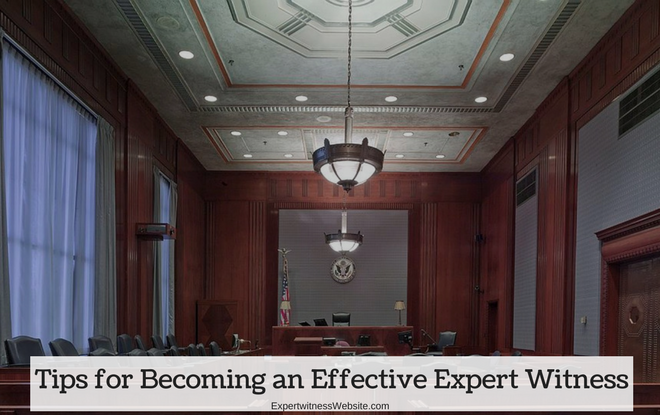
As an expert witness, you have multiple duties. Not only are you presented with the task of proving yourself as a viable resource, but you’re also subject to the challenges of the courtroom. If you haven’t set foot in a courtroom as an expert witness, you might not fully be aware of the degree to which lawyers use expert witnesses to prove their point.
Much like a professional in the tech industry, you may find that you have difficulty explaining your work to others. Expert testimony might be no different. Being considered an expert in our field can take years, if not decades, but it is your experience that can make you invaluable. With your experience, however, you’ll also develop the language that can make it difficult for others, even in a courtroom, to understand. Fortunately, we’ve put together this list of tips design to help you become the best expert witness you can possibly be.
Make a connection with the judge and jury
Lawyers call upon expert witnesses to support or verify their viewpoint in a given case. To be an effective expert witness, you’re going to want to develop a connection or mutual understanding with the judge and jury. What makes this challenging, however, is the jury itself. Because a jury consists of everyday folk, it will be important to walk the line between proving your expertise and speaking in a way that helps them understand you. To to this, keep in mind other talks that you give. For example, if you’re someone who makes presentations on a regular basis, you are probably aware of the fact that your audience contains a mix of people from all kinds of backgrounds. In that audience, there are ranges of educations, backgrounds, levels of understanding, and more. A jury is no different. A jury will not have the same amount of knowledge that you have on the subject, so it will be difficult for them to comprehend your level of understanding. In other words, whatever strategies you use to find a balance in your presentation, translate that into the courtroom and you’ll do just fine.
Keep it simple
Before stepping into the courtroom, you’ll need to examine the kind of language you plan on using. Take the time to remove the acronyms, jargon, and highfalutin vocabulary from your talk. You’re not going to get your point across effectively if you’re so far above the jury’s heads that they begin to tune you out. If you find that certain elements cannot be removed from your presentation, be sure to explain them the first time you mention them. Keep in mind that you may have to give a refresher if you’re called upon more than once.
Another way of looking at this is that you can’t speak to a jury like you would speak to a colleague. On the other hand, creating a simpler presentation doesn’t mean you need to “dumb it down” in order for everyone else to understand you. You’ll be doing the jury no favors if you appear condescending, so focus on coming from the right place. Remember, the idea is to ensure that everyone can understand you and has a clear picture as to how your information relates to the case.

Why We Need Higher Qualification Standards for Expert Witnesses

Over the years, courts have changed their standards for what makes a witness “an expert” in their subject of study, and the debate is still ongoing. Though there is still some wiggle room as to whether or not an individual is qualified to provide expert testimony on a topic, there are many common standards. So what then gave the self-named “cult specialist” and “deprogrammer” Rick Ross the opportunity to qualify as an expert in 2016 for a New York murder investigation? Some folks in the legal system are still scratching their heads about it.
About the case
Nineteen-year-old Lucas Leonard died in October 2015 from injuries he sustained during an hours-long “counseling” session at the Word of Life Christian Church in New Hartford, New York. Leonard was originally from Chadwicks, NY and both he and his brother were repeatedly beaten by their fellow parishioners during the “session.” His brother survived with severe injuries. Allegedly the “counseling session” in question was spurned by Leonard having expressed interest in leaving the church.
Police had arrested and charged the nine people involved in the assault, one being the church’s pastor Tiffanie Irwin. Irwin later plead guilty to third-degree manslaughter and felony second-degree assault for the beating of Christopher, Leonard’s younger brother.
Expert witness Rick Ross
Rick Ross, not to be confused with the rapper or cocaine kingpin, Ross was a controversial figure in the case. He claims to have intervened in 500 deprogrammings around the world. Though it was never discovered that he offered testimony in New York, Ross claims to have provided testimony in both federal court and state courts. In theory, the prosecutor’s office should have verified Ross’ website before bringing him on as an expert, though it was later determined they didn’t. As a result, the poor light shone on the legal system, not on Ross.
As a self-proclaimed destructive cult expert, Ross provided testimony for the case that Irwin’s attorney filed a motion to excluded. The timing of the motion was appropriate, but it raises the question of expert witness standards.
Expert witnesses are often called upon for trial because of their well of knowledge on a given subject. They also bring with them a history of their work, having written and published many entries on the subject as well as articles in peer-reviewed journals. At the time, Ross had none of these qualifications that deemed him an expert. So what are the long-term implications? Getting convictions is more difficult when people don’t trust the system. Whenever a prosecutor takes advantage of or “games” the system, this will become more difficult. Courts need to have a solid set of standards that make a witness an “expert” in their field. Until then, there is a vast gray area that can be exploited and may result in guilty criminals going free.
In the case of Lucas Leonard, all nine of the convicted pled out. The prosecution used Ross to try to force longer prison sentences in a plea deal. They did this by using his testimony to drum up fears of a cult situation. In the end, perhaps this method spared the state of New York a lot of prosecution cost, and maybe guilty people received the sentence they deserved for doing something completely horrible, but that doesn’t make the tactic entirely ethical.

Three Ways to Properly Cross-Examine An Expert Witness
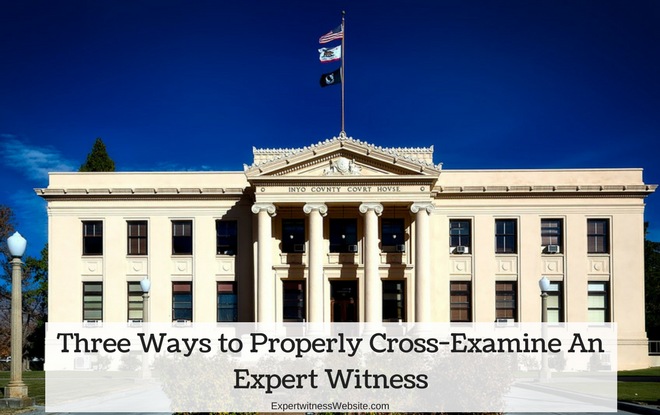
No matter how much face time you’ve had in a courtroom, cross-examining an expert witness can be a little intimidating. Because of their specialized pool of knowledge, you as the cross-examiner may feel like you’ve stepped into a college classroom but you’re the one telling the professor how to teach.
If the cross-examining of your expert witness is not thoroughly planned out, the subject matter can easily wander too far left or right and before you know it your expert witness has taken their testimony into an irrelevant space or topic. The truth of the matter is that it’s really not a level playing field. The good news is that once you accept that, it’s easier to prepare your expert witness for the courtroom.
Below are three tips that are by no means comprehensive, but they will help you better prepare for your expert witness’ cross-examination.
Research and prepare. Assuming you start the entire process by researching the expert’s qualifications, their standing within the community, and accolades in their own field, there are further preparations to be made. One of the most important things you should do is to search for any prior testimony they’ve provided. You should look for any former cases where they’ve provided conflicting testimony. Additionally, you should identify and read any prior publications they’ve written. In order to keep themselves marketable, expert witnesses often keep their own websites where they post a number of articles - these are fair game for cross-examination. You’d be surprised what kind of fuel you’ll find in their prior publications for the credibility fire.
Use the deposition to box them in. As a cross-examiner, you know that trial framework is set up long before the trial takes place. Take the opportunity to use the deposition to box them into their opinion. The American Bar Association has stated that it is absolutely critical to do so. This process includes asking the expert witness his or her exact opinions that he/she intends to give during the trial. The expert should also provide the basis for those opinions, which will help you if new or unintentional information is provided in the courtroom. Be sure to take the time at the end to ask the expert if there are any other opinions they intend to share during the trial. This will allow the cross-examiner the chance to exploit changes or nuanced opinions that pop up. Once the deposition is complete, study and master it so you know how to highlight any differences between the testimony from the deposition and that which is provided at the trial.
Ask yes or no questions. As you’re well aware, expert witnesses are very intelligent. They’re sought after for their expertise, which makes them much more informed on the subject than the attorney with few exceptions. Though asking yes or no questions seems like an obvious or dull method, allowing much room for expansion during a cross-examination can result in the expert proving his/her expertise and therefore credibility on the topic.

How to Be an Informed Expert Witness
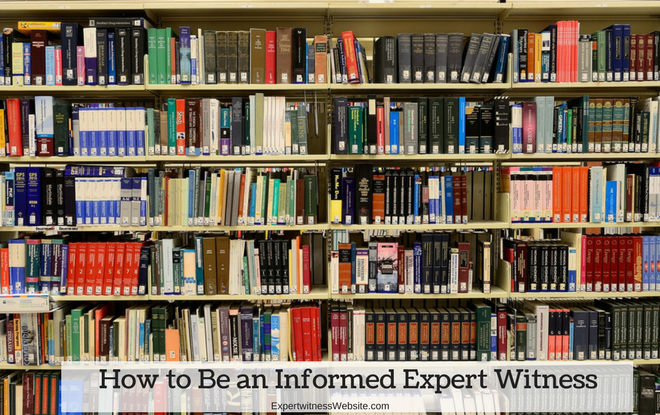
Keeping up-to-date in a world of ever-changing technology can be challenging. As an expert witness, your job is to stay on top of the latest and greatest in your field. Instead of trying to manually keep track of updates, the latest news, and litigation cases, you can stay on top of industry trends by following some simple guidelines. Social media, though it can be an interesting
place to say the least, can be quite helpful to you. Social media pages and Google are already implementing strategies for getting the latest information, so why not put them to good use? Below are some of the top methods for staying in the know without taking time away from your work.
Become a Twitter master
In addition to promoting brands and political opinions, Twitter can actually be quite helpful. In fact, Twitter is where most reporters update their cases and news stories. Most often this is done in real time. If you’re on the lookout for the latest information in your field of expertise, be sure to search for keywords that apply to your profession as well as words that will help you become a better expert witness. Look for hashtags such as #crime, #expertwitness, or #forensics, just to name a few. You’ll be able to see what other expert witnesses are saying as well as industry leaders. Be sure to follow the heavy hitters too such as Huff Post, CNN, and New York Times. They will provide you with the latest headlines and top industry news. The best part is that you won’t even have to bat an eyelash to do it. And if you’re concerned that you’ll get a feed overload, consider downloading a partner app such as TweetDeck to manage your feed.
Be a blogoholic
One of the best things about blogs is that the subject possibilities are endless. They also make great networking strategies too. If you’re new to the whole blog scene, consider expanding your network and reach out to someone in an adjacent industry. Ask that person to help you stay up-to-date with the information you need to know in order to become an effective expert witness.
Subscribe to newsletters
If you find yourself reading a given blog on a regular basis, consider a more direct approach for staying up-to-date. Newsletters are an excellent strategy for getting the word out. The best part is that they will prevent you from having to stop by the page every day.
When you subscribe to a good newsletter, you’ll begin to receive insights regarding the latest trends. Great newsletters will feature tips, insights, and trends. We know what you’re thinking, “What am I going to do with all these emails?”
Fortunately, you have the option of opening a separate email account, which will reduce the amount of wasted space since newsletter emails can clog up your email account very quickly.

Job of Expert Witness is not Easy to Endure
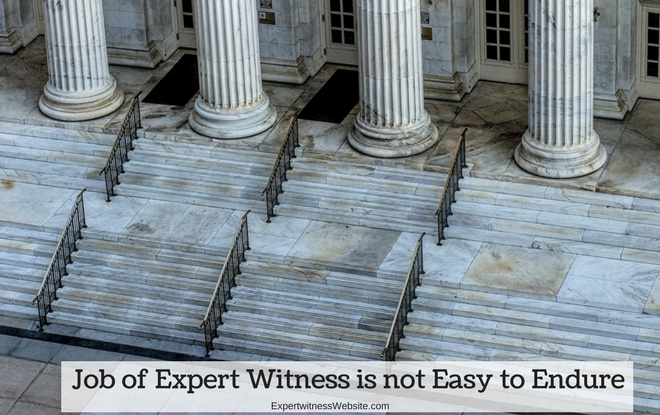
The role of expert witnesses in courts is to offer opinions and testimonies based on their knowledge of a certain trial subject. It is common for certain trials to require expert testimonies and opinions to bring out or expound on facts. As such, only people possessing pertinent experience and training are allowed to act as expert witnesses. Mostly, court experts are doctorate holders or high credentialed medical experts. However, this is a conception that is demystified by the wide nature of court cases. There are cases that doctors or doctorate holders will not have adequate knowledge about and can only be handled by experts who may not have had such high education levels.
For instance, in the movie My Cousin Vinnie, an experienced and highly knowledgeable car mechanic qualifies to be a court expert in automotive cases. The mechanic may not hold a doctorate but is well-informed and knowledgeable about vehicles. But, the fact that one has to be highly knowledgeable denotes what to expect at the court during proceedings. You have to deal with experts, experienced attorneys’, frustrated lawyers who want to win the case at all cost and above all, tough judges who value their time and only listen to what and who they consider relevant.
So, an expert’s job begins with laying a strong foundation that will support all opinions. The opinions must, however, be based on facts, and you must portray a certain degree of certainty that your views are reliable. As such, an expert never testifies to possibilities, speculates or conjectures. A lot of hard work and case analysis is required during the preparation phase. The expert must go through all case points and come up with opinions or facts that are in line with the case twists. Unfortunately, the jury may choose not to use the testimony presented by an expert in full or partially. The jury conducts their research and based on their findings they may choose to discard an expert’s opinion.
An expert court session begins with the expert reciting their training and education background relevant to the case in trial. They must state their honors, experience in the particular sector, professional associations and awards if any. The recitation is followed by a review of case evidence through hypothetical questions that prompt an expert to assume or visualize facts. In most cases, the assumed facts are disputed, and opposing counsel gets an opportunity to challenge the expert’s opinion. This makes the job hard because you have to assume/ visualize a situation before answering the hypothetical questions and later a person/ counsel will try to prove your opinions wrong by presenting reasons why your assumption is irrelevant to the case.
Also, knowing that your opinion about something could change a person’s life is not easy. You may give an honest opinion but end up changing a person’s life negatively which is not something any rational human being would wish for. All factors constant, testifying in a court of law is never easy. You can make permanent enemies or end up ruining your career because of a simple mistake like giving a professionally right opinion that may be termed wronged by the public.

How Experts Can Remain Calm in Court

Unless an expert witness has handled numerous court cases, it is hard for them to remain calm in the midst of a tough and unwavering cross-examination by an attorney determined to prove their theory/ opinions false. It takes more than literacy to retain composure and respond rationally. Actually, the few experts who try to remain rational give rhetoric answers in a bid to avoid confrontations. They try to retain a low level of agitation despite having little to no control over the court system that sometimes may seem to be against you.
Almost all lawyers have cross-examined experts and experienced at the game. So, they know how to intimidate and confuse you until you compromise your ability to offer the right expert opinion. However, your counsel has a duty to protect you if the cross-examining lawyer acts inappropriately. But that is never enough to keep you calm. So, how can an expert witness remain calm in a court of law?
Remained focused on the task at hand
Being hired as an expert witness means that you are a guru in your area of specialization. As such, you are expected to prove your point and enlighten the court regarding the issue at hand. Your job is not arguing or trying to outsmart the opposing counsel; you simply state facts and truths before offering the expert opinion. Your duty is to explain complex issues that you best understand to a court that is ready to know more. So, focus on the jury and make sure that you are familiar with court procedures. Your counsel should take you through what to expect as you prepare for the hearing together. But, do not be in a hurry to give your opinion; take your time and make sure that the jury understands your approach to the issue.
Accept fear and control how you respond
If you feel afraid, embrace the fear to avoid panicking. If it is your first time testifying as an expert, you may feel tense and afraid of the questions. To fight the fear, view the situation as an opportunity to be the hero by explaining an issue too complex that a court of law needs an expert to decipher. Also, understand that the jury needs your explanation to arrive at a conclusion or make a ruling. Even as the opposing counsel throws questions at you, view that as yet another opportunity to deepen the jury’s knowledge of the situation.
Practice
An expert witness is required to work with their counsel to plan a favorable defense strategy. Working together also means helping each other understand the situation better. As the expert, you should help the attorney understand your area of expertise. The attorney should also help you understand court proceedings and how the questions will be directed to you. You should practice a court session with your counsel to get you prepared.
Conclusion
Being on the witness stand is not easy because your opinion counts and you are hired to protect one side. So, a simple mistake can lead to failure and probably breach of your contract. But, with the right practice and dedication, you can overcome the fear. Just ensure that you get orientation from your attorney.

The 6 Phases of Denial
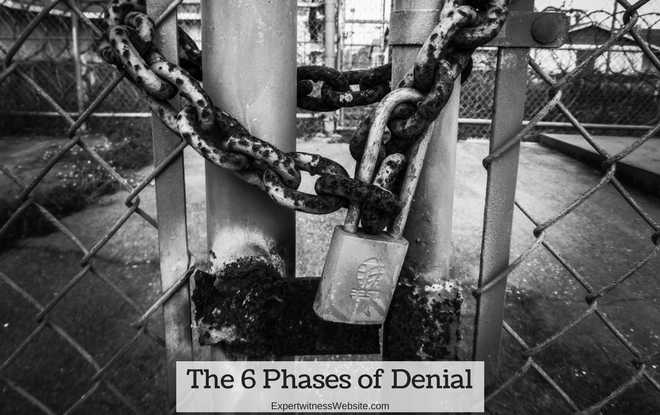
Denial is a defense mechanism that protects against the experience of pain or panic. Denial is used to define the situations in which people fail or refuse to admit obvious truths or occurrences. It is a functional way of protecting a person’s ego from situations it cannot deal with rationally. The truth is that everyone goes through denial at some point in life and while it prevents immediate pain or disappointment, it takes up a lot of energy. It can entail flat out rejection of an existing situation, admitting that a situation occurred, but its effects are not as important or accepting a situation and denying responsibility.
Denial does not only affect individuals and their personal issues but also organizational managers and the institutions they run. Managers have a responsibility to ensure that a business or their organizations run smoothly and the employees are safe, comfortable and motivated. But there comes a time when unavoidable tides hit or threaten to hit the business. Though managers may be aware of the impending business catastrophe, they may be in denial because they may not know how to prepare or deal with it.
6 phases of denial
Denial can be very expensive for any company. Denying that a catastrophe will occur and affect your employees negatively is wrong and expensive. Employees have become overly empowered; they know their rights and are ready to fight back when disrespected or feel unsafe at work. In a case where an employee gets hurts because the management was in denial, a company is sued for ignorance and failure to meet the recommended working conditions. This where denial gets expensive for the company. Apart from having to spend on a lawsuit, the company must hire an expert witness to counter employees’ claims that the company ignored impending danger because the top managers were in denial. Here is how it all begins;
It won’t happen to us
This is a phrase top managers will use when a situation strikes their competitors. They will be quick to dismiss the situation and its impact on the competitor instead of learning from the situation and getting ready to deal with it if strikes. For instance, a fumigation company is sued by an employee who developed a breathing complication for not wearing a protective mask that the company was supposed to provide. Instead of ensuring that your company ensures that employees are safe, you deny by saying “it won’t happen to us.”
It won’t happen here
This phrase would be common among organizational heads when reassuring employees that what happened with another company or a neighboring business will not affect the company.
It won’t happen now
In this scenario, company executives have recognized that a calamity will strike. However, they still deny that they have no control over when it strikes. They stick with “it won’t happen now, ” yet it is happening to other industry players.
If it does happen, it won’t be so bad
Company executives accept that a calamity can strike, but they still underestimate the damages it can cause. They ignore the importance of preparing for the outcome.
If it is bad, our insurance will cover it
This is a common phrase among top companies. They will be in denial that a situation will be bad enough to warrant adequate preparation. So, they try to find solace in their insurance covers which may not have covered the effects of an impending dangerous situation.
Why weren’t we prepared for this?
The disaster strikes and causes losses to the company. So, executives accept that the situation has fatal effects but will not accept they failed. The realization that the situation could have been prevented leaves executives in denial that they failed to protect the businesses’ interests.
Bottom line
The six phases of denial clearly highlight how organizations ignore impending dangerous situations and end up in court. They hire expert witnesses who analyze their misfortune and convince the court that indeed, the misfortune could not have been prevented.

Communicating With Your Expert Witness
 In most cases, expert witness opinions and testimonies make or break a case. That is why people do in-depth research and vetting before choosing the expert to work with. Winning a case is always the epitome of attending long court sessions, hiring attorneys and expert witnesses. As such, you want a qualified expert witness who is also easy to work with and relate with your counsel. He/she must be willing to work with your attorney, communicate and draft an engagement letter throughout the trial.
In most cases, expert witness opinions and testimonies make or break a case. That is why people do in-depth research and vetting before choosing the expert to work with. Winning a case is always the epitome of attending long court sessions, hiring attorneys and expert witnesses. As such, you want a qualified expert witness who is also easy to work with and relate with your counsel. He/she must be willing to work with your attorney, communicate and draft an engagement letter throughout the trial.
How to ensure a good expert and attorney working relationship
Have a retainer agreement
An engagement letter or retainer agreement sets the foundation for a solid and smooth attorney-expert working relationship. The retainer agreement should clearly state the working terms and should be in easy to read provisions. Its aim is reminding both parties of their contractual obligations and mitigating any surprises that may arise when the trial is in progress. Define the services to be offered by both parties. Define whether the expert will testify during the trial or at a deposition or their duty is to act simply as a consultant. Note the materials that will be used during the trial and the kind of preparation you expect from each party.
Discuss potential conflicts and prior disqualifications
If the expert you choose had been disqualified from continuing with their testimony in a court of law, it is important to discuss the disqualification to ensure that the same does not happen with your case. Most experts are disqualified due to substantive testimony where their science or opinion is relatively new and hard to prove. If that was the case, make it clear that they should use the specific expertise in your case. However, an expert may also be disqualified due to conflict of interest. For instance, if the expert had been hired as an expert by the opposing party, the opposing party has the right to file for a disqualification.
Provide all necessary materials
The expert needs to analyze all the case details. As such, he/she should be provided with all relevant case materials. Also, they should have a timeline where they work with the attorney to design a workable defense. Ensure that you provide the expert will all the materials and information they ask for and give them enough time to go through the documents, conduct experiments and analyze scientific evidence where applicable.
Be mindful of written communications
According to rule 26 of the Federal Rules of Civil Procedure, an expert witness is required to provide the opposing side with a copy of the testimony they intend to present to the court. The report should contain all the opinions the expert witness will present, their basis and reasons for bringing up the opinions. The rule also mandates disclosure of data, facts, and exhibits that the expert intends to use. So, the expert and your attorney should work together especially when disclosing such information that may change your case if disclosed unprofessionally.
Set rules for testimony
Preparation is key if you want to have a strong defense team. As such do not overlook the need for cross and direct examinations. The attorney and expert should have a direct examination where the attorney asks the expert questions based on the testimony he/she presents. The questions should prepare the expert on how to respond to the opposing counsel.
Bottom line
Just like all strong working relationships, healthy and regular communication between your attorney and your expert witness is important. They must work together to deliver a winning defense strategy.

What Jurors Do not Know About Defense Medical Experts
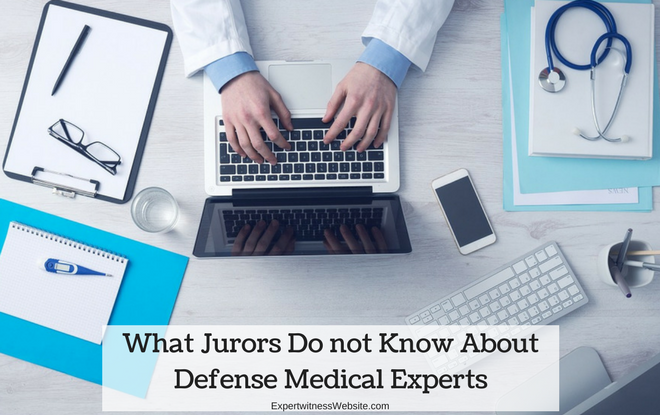
Workplace injury cases that mainly happen due to negligence often require a medical expert to testify. A plaintiff relies on what the doctors say or testifies in court to get justice. It is obvious that once injured; you will run to your personal doctor who will examine and note the nature and extent of injuries you sustain. Your doctor will have your best interest at heart he/she will testify to the best of their knowledge to protect you and ensure that you get the right compensation. However, every defendant will have their doctors who must also examine you; the plaintiff and testify in a court of law. The defendant’s doctor will present their opinion about the plaintiff’s nature and severity of injuries. So, it becomes a plaintiff’s doctor’s version versus the defendant’s doctor’s version.
It is no secret that employers and companies use the same doctors as medical expert witnesses. A few doctors who are known to protect the interests of a company that pays well are hired by other industry players. Since their duty is to protect their big pay, they rarely agree with the plaintiff’s doctors regarding the extent of the injuries. Serious injuries will warrant higher monetary compensation. As such, they will relegate the extent of the injuries to protect their clients from losing a lot of money.
To the juror, the defending medical experts are on equal footing with a plaintiff’s treating physician. The plaintiff’s counsel will do their best to prove that the defendant’s medical experts are paid a yearly fee for to appear in court and for their time. However, defending medical experts always have a way of convincing the juror. They will bring their professional and ethical side by questioning why they should risk their career by sticking out for a single company. Though the juror will fall for this.
The jurors fail to understand that if the defending medical experts decided to side with the plaintiff’s doctor, the attorney might not hire them again to conduct defense examinations. This would mean the loss of income for the doctors. It is as simple as, if a defending doctor loses one case, they lose a company and other companies will no longer trust the doctor’s capability at defending their interests in court.
Though insurance companies will pay good money to protect their name and wealth, it is important for medical expert witnesses to remain ethical during their sessions. This also applies to plaintiff doctors who exaggerate the extent of injuries with the aim of getting more money from the plaintiff. At the end of the day, someone will be suing because they were neglected at work and it is only fair if justice is served. Alternatively, courts should consider appointing their unbiased medical defense experts to examine plaintiffs and offer their opinion to the juror. This would make work easier for the juror because they would have to side with the doctor whose statement matches that of their unbiased medical expert.
ExpertWitness.com does not guarantee or endorse this article.

Can expert witnesses be sued

Expert witnesses have become important in courts of law, and their professional or expertise opinion is helpful at solving complicated cases. Due to their knowledge and experience on certain technical and scientific matters, the court will prioritize their testimonies. This reliance on an expert’s opinion to solve cases can cause trouble if the expert provides misleading or false statement. Can the attorney who loses a case due to an expert’s unprofessionalism sue?
Witness impunity
Traditionally all experts witnesses in the United States were considered immune from suits for any reliable testimony they offer a court or law. This means that even if the expert made a mistake or provided false information, he/she cannot be sued. As a matter of fact, even when a witnesses’ opinion is made maliciously and knowingly, the court states that the affected attorney cannot recover the damages. So, expert witnesses are protected by the law. A fact that promotes expert witness impunity.
But on the other hand, if it was possible for attorneys to sue experts who make false or offer misleading information, would there be any expert willing to testify in a court of law? But they are experts in their fields meaning that they are smart people. So, there is a chance that they would distort testimonies where they suspect that their statements would leave them vulnerable to liability. So, some complainants would never get justice.
Expert witness protection was further supported by the Supreme Court in 1983 when it ruled that fact witnesses, especially in criminal proceedings, are immune from suits for any declarations and information they offer in court.
Changes with time
In the recent past, most jurisdictions have come to the realization that expert witness immunity is real and some attorneys lose credibility due to experts who malpractice or breach contracts. As such, states like Massachusetts, Pennsylvania, Louisiana, California, Connecticut, and Missouri have permitted attorneys to sue expert witnesses who fail to honor their contracts to the end or malpractice. New Jersey and Vermont ruled that court-appointed expert witnesses are liable if they neglect their performance or fail to act professionally.
These states worked under the rationale that, experts do not need to be protected by the law to offer correct information. It also means that courts are not that desperate to get the truth from experts that they must hold them harmless for the deliberate malpractices, negligence, and misleading information. The courts also conduct their investigations and do not solely rely on the opinions offered by experts to make a verdict.
Additionally, Michigan and Tennessee have also ruled in favor of upholding expert witness impunity. Michigan allows attorneys to sue experts for damages they incur because of relying on an expert's mistaken opinions. This means that expert witnesses must be careful with the information they provide. Though they must uphold the truth, intentionally offering false information and malpractice can lead them to trouble.
In conclusion, expert witnesses were once protected by the law but time is changing this fact. As the states change the immunity clauses slowly, experts should learn how to offer correct and factual information.
ExpertWitness.com does not guarantee or endorse this article.
??

The Ultimate Guide to the Federal Rules of Evidence and Expert Witnesses
In the United States, admissibility of evidence used in federal and state courts is governed by a body known as the Federal Rules of Evidence. This piece will discuss Article VII of the Federal Rules of Evidence that covers admissibility of expert witnesses and six other rules. As such, it is important for attorneys’ hoping to introduce or exclude expert testimony during a trial to analyze and comprehend the Article VII.
Rules under Article VII
Rule 701: opinion testimony by lay witnesses
The first rule defines what expert testimony is not; lay witness testimony is not expert witness testimony. The rule states that if a trial witness does not testify as an expert, their opinion testimony ought to be;
- Logically based on the testifier’s perception; requires first-hand observation.
- Helpful by clearly demystifying a fact from an issue and in clearly explaining the witnesses’ testimony. Calls for a meaningful lay witness opinion.
- Not based on technical, scientific or any form of specialized knowledge that falls under rule 702. Contrasts subsection a, and b.
Under this rule, the courts will analyze lay opinions by determining whether the presented testimony correlates with a witness’ observation, experience or daily reasoning.
Rule 702: expert witness testimony
This rule guides the court in determining the permissibility of the presented expert testimony. The rule considers expert opinion acceptable if;
- The technical, scientific or specialized information presented by an expert will assist the trier to understand facts arising from the evidence.
- The testimony is based on sufficient data and case facts.
- The testimony is based on reliable methods and principles.
- The expert has applied the methods and principles before reliably.
Rule 702 seeks to establish the reliability and relevance of expert opinions and testimonies.
Rule 703: expert opinion testimony base
This rule sets the base from which experts present their opinions and allows them to base opinions from court acceptable information. As such, the opinion should be based on date or facts that the expert has personally observed or made to understand. Expert opinion can be based on admissible evidence as long as it is reasonable and can be relied on. Also, the opinions are only presented to the jury if it is classified as helpful in resolving a case.
Rule 704: ultimate issue opinions
Rule 704 gives an expert power to testify as to ultimate fact issues. But, experts at criminal cases cannot testify whether a defendant was not in the right mental state when committing the offense. As such, expert opinion cannot be conclusive or prevent the jury from conducting further analysis.
Rule 705: disclosing expert opinion facts and data
Rue 705 defines how an expert should disclose their opinions and testimonies. It allows an expert to present their opinion without stating the underlying data and facts as evidence. It broadened common laws by allowing experts to use information that would have otherwise been classified as inadmissible during a trial and could not have been disclosed to the jury.
Rule 706: expert witnesses appointed by the court
It allows courts to choose experts to work on different cases. They are referred to as court-appointed experts who must advise all parties without favor. This rule ensures that the court has access to expert guidance in cases where both parties did not hire an expert.
Conclusion
Article VII lays the foundation on how courts use expert opinions and evidence rules. The article highlights the importance and the role of expert witness in solving complex cases.

Expert Witnesses: The Difference Between Medical and Forensic

When you think of the phrase “expert witness” chances are you think of someone with medical expertise. While it is true that medical experts are among the most common types of witnesses, you may not necessarily know what they do.
Medical expert witnesses typically testify for malpractice trials and cases where a violent crime took place. Most often medical experts are doctors but they can also be nurses, physician’s assistants, or other medical professionals.
Quite often, the witness will be the medical examiner who evaluated the body during the investigation. They are typically brought in to discuss the cause and manner of death. Whether the client is a plaintiff or a defendant, the testimony of an expert witness may be beneficial.
An experienced and qualified medical expert will be able to examine the facts and materials of the case, including medical records, and provide unbiased testimony. Medical witnesses often prepare written statements, create models, or prepare other visual aids that will assist them in explaining their theories. They can also prepare written reports to present before the court and judge.
Medical experts often rely on their years of personal experience to provide testimony. They may also use their years of academic study and publications they produced over the years. Often times, in order to be considered qualified, medical experts publish works in peer-review journals, so they may turn to some of those works to prove their theory.
When calling upon a medical expert, it’s important to look for someone who can explain the scientific and technical language as well as the specialized jargon so that someone outside the field can understand the key issues of the case.
Forensic medical experts
The term “forensic” means any type of science that can be applied to the law. If you put the two together, forensic experts aren’t all that different from medical experts. Forensic expert witnesses can include chemists, anthropologists, blood spatter analysts, ballistic experts, biologists, psychologists, computer science experts, and criminal behavior experts.
Typically law enforcement agencies have a dedicated team of forensic scientists who analyze evidence and provide testimony in court. When called upon for a trial, forensic scientists have the task of explaining particular pieces of evidence and information that would support the side that called upon them.
Forensic experts are often set apart from other experts because they often, if not always, refer to the direct evidence of the case. A medical expert may provide testimony that concerns a general concern, question, or concept that’s significant to the case on trial, but would not touch on the actual evidence of the current case.
Just like a medical expert, forensic experts must provide honest, unbiased testimony, thus they act as advocates for the evidence itself. If a forensic expert is asked by an attorney to support a theory or opinion that cannot be supported by the evidence itself, then the forensic expert should not testify in that particular trial.
